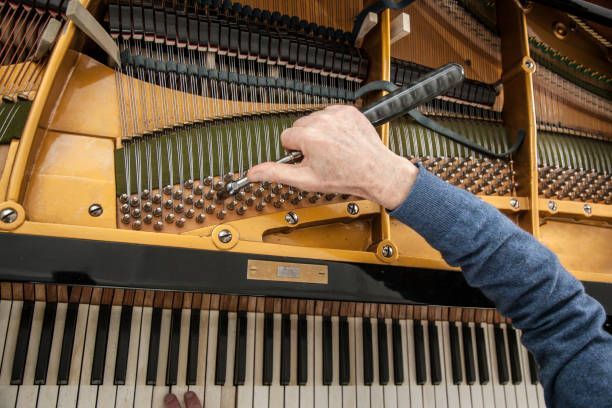Play the Music In You!
Piano Tuning
Piano tuning is important to preserve the beauty and integrity of your instrument. Whether you're a seasoned musician or an enthusiastic amateur, understanding why piano tuning is crucial can greatly enhance your appreciation for this timeless art form.
Why Piano Tuning Matters
At its core, the piano is a complex interplay of strings, hammers, and keys, meticulously engineered to produce a rich tapestry of sound. However, like any finely tuned machine, it requires regular maintenance to ensure optimal performance. Piano tuning isn't just about correcting off-key notes; it's about preserving the instrument's tonal balance, clarity, and resonance. A well-tuned piano not only sounds better but also feels more responsive, inspiring greater creativity and expression in the musician.

The Frequency of Piano Tuning
One of the most common questions pianists ask is, "How often should I tune my piano?" While there's no one-size-fits-all answer, several factors influence the tuning frequency:
- Climate and Environment: Changes in humidity and temperature can cause the piano's wooden components to expand or contract, affecting string tension and pitch. In areas with extreme weather fluctuations, pianos may require more frequent tuning to maintain stability.
- Frequency of Use: Pianos that are played regularly, such as those in music schools or concert venues, experience more wear and tear on their strings and mechanisms. Consequently, they may need tuning every three to six months to keep them in top condition. On the other hand, a piano in a private home that sees moderate use might be tuned annually.
- Newly Acquired Pianos: If you've recently acquired a new piano or had it moved to a new location, it's essential to schedule a tuning shortly afterward. The process of acclimatizing to its new environment can cause the instrument's pitch to fluctuate, requiring adjustment by a professional tuner.
- Age and Condition: Older pianos or those that have been neglected for an extended period may have more significant tuning issues due to wear and tear. In such cases, more frequent tuning and possibly additional maintenance may be necessary to restore the instrument to its former glory.
Piano tuning is not just a routine maintenance task, it's a vital aspect of caring for your instrument and ensuring its longevity. By understanding why piano tuning is important and recognizing the factors that influence tuning frequency, you can take proactive steps to preserve the beauty and integrity of your piano for years to come. Whether you're a dedicated musician or simply appreciate the joy of playing, investing in regular piano tuning is a commitment to maintaining harmony in every note.
Call the professionals at Peabodys Piano Today to schedule!
Contact Information
Phone: (804) 794-8100
Email: peabodyspiano@outlook.com
Address: 1111 Alverser Drive, Midlothian, Virginia 23113, United States